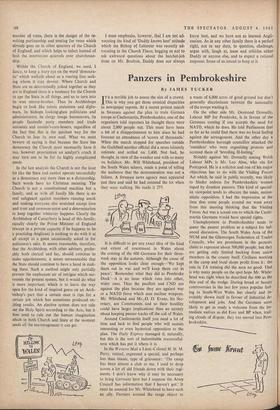Panzers in Pembrokeshire
By JAMES TUCKER TT'S a terrible job to assess the size of a crowd. 'This is why you get those comical disparities in newspaper reports. At a recent protest march in Swansea against the plan to train German troops at Castlemartin, Pembrokeshire, one of the organisers told reporters he thought there were about 2,000 people out. This must have been a bit of a disappointment to him since he had forecast an attendance of 'scores of thousands.' When the march stopped for speeches outside the Guildhall another official did a more leisurely estimate and settled on 1,400. Not bad, he thought, in view of the weather and with so many on holidays. Mr. Will Whitehead, president of the South Wales miners, made a point of telling the audience that the demonstration was not a failure. A Swansea news agency man appeared just then and said he had counted the lot when they were walking. He made it 275.
It is difficult to get any exact idea of the kind and extent of resentment in Wales about the coming of the 600 Germans for their three- week stay in the autumn. Although the cause of the opposition looks clear enough—'We kept them out in war and we'll keep them out in peace'; 'Remember what they did to Pembroke Dock'—it is an issue which runs into other, wider ones. Thus the pacifists and CND are against the plan because they are against war or a NATO force which uses nuclear weapons. Mr. Whitehead and Mr. D. D. Evans, his Sec- retary, are Communists and so their hostility could have larger implications than an anxiety about keeping panzer tracks off the soil of Wales.
Around Castlemartin itself you need a lot of time and luck to find people who will sustain interesting or even hysterical opposition to the plan. The Daily Express managed it, naturally, but this is the sort of indomitable resourceful- ness which has put it where it is.
In the Western Mail a Lieut.-Colonel H. St. M. Perry, retired, expressed a special, and perhaps less than titanic, type of grievance : 'The camp has been almost a club to me. I used to drop across a lot of old friends down with their regi- ments. I don't know why it may be necessary to bring Germans here but I suppose the Army Council has information that I haven't got.' It must be unusual for Mr. Whitehead to have such an ally. Farmers around the range object to a waste of 6,000 acres of good ground but don't generally discriminate between the nationality of the troops wasting it.
On the other side Mr. Desmond Donnelly, Labour MP for Pembroke, is in favour of the Germans coming if one accepts the need for NATO, which he does. He told Parliament that as far as he could find there was no local feeling against the arrangement. And the other day a Pembrokeshire borough councillor attacked the `outsiders' who were organising protests and accused them of 'breeding ill-feeling.'
Notably against Mr. Donnelly among Welsh Labour MPs is Mr. Leo Abse, who sits for Pontypool. He is a solicitor and one of his major objections has to do with the Visiting Forces Act which, he said in public recently, was likely to hinder redress for Pembrokeshire women raped by drunken panzers. This kind of special- ist viewpoint tends to obscure the main, nation- alistic opposition. I had the impression at the time that some people around me went away from this meeting thinking that the Visiting Forces Act was a sexual one to which the Castle- martin Germans would have special rights.
Unemployment in Pembrokeshire tends to queer the panzer problem as a subject for bal- anced discussion. The South Wales Area of the NUM and the Glamorgan Federation of Trades Councils, who are prominent in the protests, claim to represent about 500,000 people; but they are getting only limited backing from union members in the county itself. Civilians working at the camp and local shops profit from it : the cuts in TA training did the area no good. That is why many people on the spot hope Mr. White- head was right when he described the 600 as -the thin end of the wedge. During bread or beauty controversies in the last few years popular feel- ing in South-West Wales has clearly and in- evitably shown itself in favour of industrial de- velopment and jobs. And the Germans seem likely to get as ready a welcome from the im- mediate natives as did Esso and BP when, trail- ing clouds of dispute, they too moved into Pem- brokeshire.


































 Previous page
Previous page